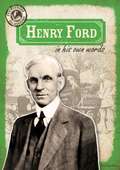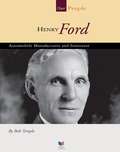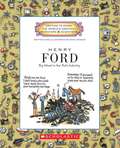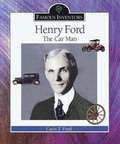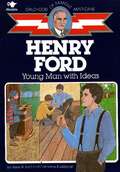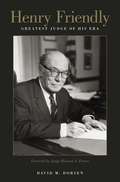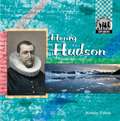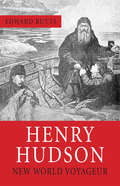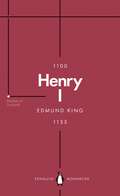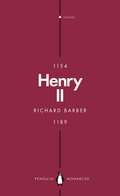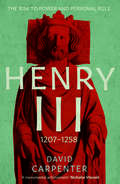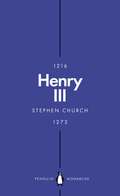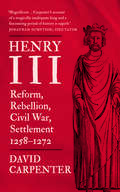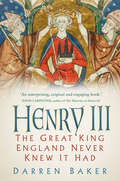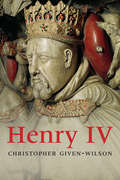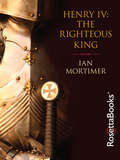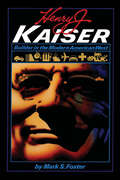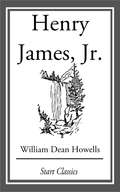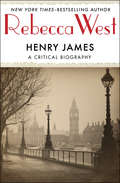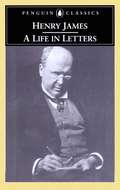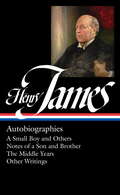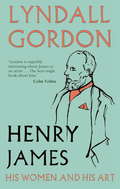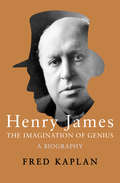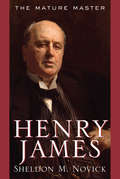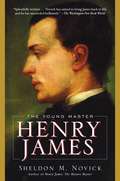- Table View
- List View
Henry Ford in His Own Words
by Ryan NagelhoutHenry Ford, founder of the Ford Motor Company, didn't invent the car or even his famous assembly line. However, he was the innovator who made these things wildly successful. In fact, his practices and ideas shaped American life and business in the twentieth century, even helping the war effort in World War II, and continue to do so today. This biography uses quotations and writings to trace Henry Ford's rise from humble farm boy to thriving entrepreneur.
Henry Ford: Automobile Manufacturer and Innovator
by Bob TempleA biography of the man responsible for mass producing the automobile in the early part of the twentieth century.
Henry Ford: Big Wheel in the Auto Industry
by Mike VeneziaThis colorful business giant didn't just revolutionize the way the world travels he changed the way it works! Take a ride in the fast lane with Henry Ford, father of the automobile, the assembly line, and 20th-century American industry.
Henry Ford: The Car Man
by Carin T. FordA simple biography of the man who revolutionized American industry with his assembly-line production of automobiles.
Henry Ford: Young Man with Ideas (Childhood of Famous Americans Series)
by Hazel B. Aird Catherine RuddimanA fictionalized biography of the early life of the American automotive industrialist who founded the Ford Motor Company and pioneered in assembly-line methods of mass production.
Henry Friendly, Greatest Judge of His Era
by David M. DorsenFriendly served on the Second Circuit from 1959 to 1986. In the foreword, Judge Richard A. Posner refers to his own skeptical statements about the utility of biographies of judges; pointedly, he reverses that opinion completely with regard to this biography. Washington, D. C. -based attorney Dorsen draws on extensive research and interviews to provide a thoroughly engaging portrait of a brilliant and esteemed man. Belknap Press is an imprint of Harvard U. Press. Annotation ©2012 Book News, Inc. , Portland, OR (booknews. com)
Henry Hudson
by Kristin PetrieThis biography introduces young readers to the life of Englishman Henry Hudson. Readers learn that Hudson's grandfather helped form the Muscovy Company and that Hudson himself later sailed for the Muscovy Company, trying to find a passage to Asia through the North Pole. Hudson's family life and work as a cabin boy are also discussed, as well as his voyage with John Davis to the Canadian Arctic. Through engaging text, readers learn that Hudson's goal was to find a shorter route from Europe to Asia through the Arctic Ocean. His attempts to find a northwest passage to Asia while working for the Dutch East India Company and the British East India Company are explained. Readers also discover that on his final voyage, Hudson was the victim of a mutiny and left to die in the Hudson Bay. The book explains that Hudson's discoveries led to Dutch and English colonization of North America and that today a strait, a bay, and a river are named after Hudson. The book also introduces the idea that Hudson's North American discoveries led other explorers to discover a Northwest Passage.
Henry Hudson: New World Voyager
by Edward ButtsIn 1607 Henry Hudson was an obscure English sea captain. By 1610 he was an internationally renowned explorer. He made two voyages in search of a Northeast Passage to the Orient and had discovered the Spitzbergen Islands and their valuable whaling grounds. In the process, Hudson had sailed farther north than any other European before him. In 1609, working for the Dutch, he had explored the Hudson River and had made a Dutch colony in America possible. Sailing from England in 1610, on what would be his most famous voyage, Hudson began his search for the Northwest Passage through the Canadian Arctic. This was also his last exploration. Only a few of the men under his command lived to see England again. Hudson’s expedition was one of great discovery and even greater disaster. Extreme Arctic conditions and Hudson’s own questionable leadership resulted in the most infamous mutiny in Canadian history, and a mystery that remains unsolved.
Henry I: The Father of His People (Penguin Monarchs)
by Edmund King'To be a medieval king was a job of work ... This was a man who knew how to run a complex organization. He was England's CEO'The youngest of William the Conqueror's sons, Henry I came to unchallenged power only after two of his brothers died in strange hunting accidents and he had imprisoned the other. He was destined to become one of the greatest of all medieval monarchs, both through his own ruthlessness, and through his dynastic legacy. Edmund King's engrossing portrait shows a strikingly charismatic, intelligent and fortunate man, whose rule was looked back on as the real post-conquest founding of England as a new realm: wealthy, stable, bureaucratised and self-confident.
Henry II: A Prince Among Princes (Penguin Monarchs)
by Richard BarberHenry II (1154-89) through a series of astonishing dynastic coups became the ruler of an enormous European empire. One of the most dynamic, restless and clever men ever to rule England, he was brought down both by his catastrophic relationship with his archbishop Thomas Becket and his debilitating arguments with his sons, most importantly the future Richard I and King John. His empire may have ultimately collapsed, but in Richard Barber's vivid and sympathetic account the reader can see why Henry II left such a compelling impression on his contemporaries.
Henry III: 1207-1258
by David CarpenterThe first in a ground-breaking two-volume history of Henry III’s rule, from when he first assumed the crown to the moment his personal rule ended Nine years of age when he came to the throne in 1216, Henry III had to rule within the limits set by the establishment of Magna Carta and the emergence of parliament. Pacific, conciliatory, and deeply religious, Henry brought many years of peace to England and rebuilt Westminster Abbey in honor of his patron saint, Edward the Confessor. He poured money into embellishing his palaces and creating a magnificent court. Yet this investment in "soft power" did not prevent a great revolution in 1258, led by Simon de Montfort, ending Henry's personal rule. Eminent historian David Carpenter brings to life Henry's character and reign as never before. Using source material of unparalleled richness—material that makes it possible to get closer to Henry than any other medieval monarch—Carpenter stresses the king’s achievements as well as his failures while offering an entirely new perspective on the intimate connections between medieval politics and religion.
Henry III: A Simple and God-Fearing King (Penguin Monarchs)
by Stephen ChurchHenry III was a medieval king whose long reign continues to have a profound impact on us today. He was on the throne for 56 years and during this time England was transformed from being the private play-thing of a French speaking dynasty into a medieval state in which the king answered for his actions to an English parliament, which emerged during Henry's lifetime. Despite Henry's central importance for the birth of parliament and the development of a state recognisably modern in many of its institutions, it is Henry's most vociferous opponent, Simon de Montfort, who is in many ways more famous than the monarch himself. Henry is principally known today as the driving force behind the building of Westminster Abbey, but he deserves to be better understood for many reasons - as Stephen Church's sparkling account makes clear.Part of the Penguin Monarchs series: short, fresh, expert accounts of England's rulers in a highly collectible format
Henry III: Reform, Rebellion, Civil War, Settlement, 1258-1272 (The English Monarchs Series #2)
by David CarpenterThe second volume in the definitive history of Henry III’s rule, covering the revolutionary events between 1258 and the king’s death in 1272 After coming to the throne aged just nine, Henry III spent much of his reign peaceably. Conciliatory and deeply religious, he created a magnificent court, rebuilt Westminster Abbey, and invested in soft power. Then, in 1258, the king faced a great revolution. Led by Simon de Montfort, the uprising stripped him of his authority and brought decades of personal rule to a catastrophic end. In the brutal civil war that followed, the political community was torn apart in a way unseen again until Cromwell. Renowned historian David Carpenter brings to life the dramatic events in the last phase of Henry III’s momentous reign. Carpenter provides a fresh account of the king’s strenuous efforts to recover power and sheds new light on the characters of the rebel de Montfort, Queen Eleanor, and Lord Edward—the future Edward I. A groundbreaking biography, Henry III illuminates as never before the political twists and turns of the day, showing how politics and religion were intimately connected.
Henry III: The Great King England Never Knew It Had
by Darren Baker‘Henry III is generally classed among the weakest and most incompetent of England’s medieval kings. Darren Baker tells a different story.’- Michael Clanchy, author of England and Its Rulers, 1066–1307 ‘A personal and detailed narrative…bring[s] alive the glamour and personalities of thirteenth-century England.’- Huw Ridgeway, author of ‘Henry III’, Oxford Dictionary of National Biography ‘Enterprising, original and engaging’ - David Carpenter, author of The Reign of King Henry III Henry III (1207–72) reigned for 56 years, the longest-serving English monarch until the modern era. Although knighted by William Marshal, he was no warrior king like his uncle Richard the Lionheart. He preferred to feed the poor to making war and would rather spend time with his wife and children than dally with mistresses and lord over roundtables. He sought to replace the dull projection of power imported by his Norman predecessors with a more humane and open-hearted monarchy. But his ambition led him to embark on bold foreign policy initiatives to win back the lands and prestige lost by his father King John. This set him at odds with his increasingly insular barons and clergy, now emboldened by the protections of Magna Carta. In one of the great political duels of history, Henry struggled to retain the power and authority of the crown against radical reformers like Simon de Montfort. He emerged victorious, but at a cost both to the kingdom and his reputation among historians. Yet his long rule also saw extraordinary advancements in politics and the arts, from the rise of the parliamentary state and universities to the great cathedrals of the land, including Henry’s own enduring achievement, Westminster Abbey.
Henry IV
by Chris Given-WilsonHenry IV (1399-1413), the son of John of Gaunt, duke of Lancaster, seized the English throne at the age of thirty-two from his cousin Richard II and held it until his death, aged forty-five, when he was succeeded by his son, Henry V. This comprehensive and nuanced biography restores to his rightful place a king often overlooked in favor of his illustrious progeny. Henry faced the usual problems of usurpers: foreign wars, rebellions, and plots, as well as the ambitions and demands of the Lancastrian retainers who had helped him win the throne. By 1406 his rule was broadly established, and although he became ill shortly after this and never fully recovered, he retained ultimate power until his death. Using a wide variety of previously untapped archival materials, Chris Given-Wilson reveals a cultured, extravagant, and skeptical monarch who crushed opposition ruthlessly but never quite succeeded in satisfying the expectations of his own supporters. "
Henry IV: The Righteous King
by Ian MortimerThe real life story of the Plantagenet ruler, by &“the most remarkable medieval historian of our time&” (The Times, London). The talented, confident, and intelligent son of John of Gaunt, Henry IV started his reign as a popular and charismatic king after he dethroned the tyrannical and wildly unpopular Richard II. But six years into his reign, Henry had survived eight assassination and overthrow attempts. Having broken God&’s law of primogeniture by overthrowing the man many people saw as the chosen king, Henry IV left himself vulnerable to challenges from powerful enemies about the validity of his reign. Even so, Henry managed to establish the new Lancastrian dynasty and a new rule of law—in highly turbulent times. In this book, noted historian Ian Mortimer, bestselling author of The Time Traveler&’s Guide to Medieval England and The Time Traveler&’s Guide to Elizabethan England, goes beyond the legend portrayed in Shakespeare&’s history play, and explores the political and social forces that transformed Henry IV from his nation&’s savior to its scourge.
Henry J. Kaiser: Builder in the Modern American West
by Mark S. Foster&“His standing as a lesser-known in a business pantheon that would include such names as Ford and Carnegie makes this work of some scholarly importance.&” —Library Journal In the 1940s Henry J. Kaiser was a household name, as familiar then as Warren Buffett and Donald Trump are now. Like a Horatio Alger hero, Kaiser rose from lower-middle-class origins to become an enormously wealthy entrepreneur, building roads, bridges, dams, and housing. He established giant businesses in cement, aluminum, chemicals, steel, health care, and tourism. During World War II, his companies built cargo planes and Liberty ships. After the war, he manufactured the Kaiser-Frazer automobile. Along the way, he also became a major force in the development of the western United States, including Hawaii. Henry J. Kaiser: Builder in the Modern American West is the first biography of this remarkable man. Drawing on a wealth of archival material never before utilized, Mark Foster covers Kaiser&’s entire life (1882–1967), painting an evenhanded portrait of a man of driving ambition and integrity, demonstrating Kaiser as the prototypical &“frontier&” entrepreneur who often used government and union support to tame the &“wilderness.&” Today the Kaiser legacy remains great. Kaiser played a major role in building the Hoover, Bonneville, Grand Coulee, and Shasta dams. The Kaiser-Permanente Medical Care Program still provides comprehensive health care for millions of subscribers. Kaiser-planned communities remain in Los Angeles; San Francisco; Portland, Oregon; and Boulder City, Nevada. Kaiser Engineers was actively engaged in hundreds of huge construction jobs across the nation and around the world. US and business historians, scholars of the modern West, and general readers will find much to absorb in this well-written biography.
Henry James, Jr.
by William Dean HowellsWilliam Dean Howells (1837-1920) was an American realist author and literary critic. He wrote his first novel, Their Wedding Journey, in 1871, but his literary reputation really took off with the realist novel A Modern Instance, published in 1882, which describes the decay of a marriage. His 1885 novel The Rise of Silas Lapham is perhaps his best known, describing the rise and fall of an American entrepreneur in the paint business. His social views were also strongly reflected in the novels Annie Kilburn (1888) and A Hazard of New Fortunes (1890). While known primarily as a novelist, his short story "Editha" (1905) - included in the collection Between the Dark and the Daylight (1907) - appears in many anthologies of American literature. Howells also wrote plays, criticism, and essays about contemporary literary figures such as Ibsen, Zola, Verga, and, especially, Tolstoy, which helped establish their reputations in the United States. He also wrote critically in support of many American writers. It is perhaps in this role that he had his greatest influence.
Henry James: A Critical Biography
by Rebecca WestThe first book by distinguished novelist, journalist, and literary critic Rebecca West: a biography of Henry JamesSetting the standard for a century&’s worth of criticism, Rebecca West diagnosed Henry James as an American who &“could never feel at home until he was in exile&” in this slim, readable biography, published just a few months after his death in 1916.West boldly assesses Roderick Hudson as &“not a good book,&” and displays remarkable foresight in describing Daisy Miller as a &“sad and lovely&” book that &“will strike each new generation afresh.&” An early advocate of feminist principles, she has fascinating things to say about James&’s heroines, and her division of his work into early and late periods continues to be a basic principle of Jamesian scholarship.One of the twentieth century&’s brightest minds, Rebecca West began her career as a public intellectual with this thoughtful and compelling study of a literary giant. This ebook has been professionally proofread to ensure accuracy and readability on all devices.
Henry James: A Life in Letters
by James HenryJames's correspondents included presidents and prime ministers, painters and great ladies, actresses and bishops, and the writers Robert Louis Stevenson, H.G. Wells and Edith Wharton. This fully-annotated selection from James's eloquent correspondence allows the writer to reveal himself and the fascinating world in which he lived. The letters provide a rich and fascinating source for James' views on his own works, on the literary craft, on sex, politics and friendship. Together they constitute, in Philip Horne's own words, James' 'real and best biography'.
Henry James: A Small Boy and Others / Notes of a Son and Brother / The Middle Years / Other Writings
by Henry James Philip HorneThe most extensive collection of Henry James's autobiographical writings ever published offers a revelatory self-portrait from one of America's supreme novelists and his famous family. In 1911, deeply affected by the death of his brother William the year before, Henry James began working on a book about his early life. As was customary for James in his later years, he dictated his recollections to his secretary Theodora Bosanquet, who recalled how "a straight dive into the past brought to the surface treasure after treasure." A Small Boy and Others (1913) and the two autobiographical books that followed--Notes of a Son and Brother (1914) and the incomplete, posthumously published The Middle Years--stand with his later novels as one of the enduring triumphs of his final years. Not only did James create one of the singular self-portraits in American literature, he also fashioned a richly detailed account of his renowned family, especially his father, the social philosopher Henry James Sr., his brother William, and his dear cousin Minny Temple, inspiration for the heroines of two of his greatest novels, The Portrait of a Lady and The Wings of the Dove.Rounding out the volume is a selection of eight other personal reminiscences and, as an appendix, his secretary's insightful and affectionate memoir, "Henry James at Work."From the Hardcover edition.
Henry James: His Women and His Art
by Lyndall GordonJames's friendship with Constance Fenimore Woolson ended in 1894 when he tried to drown a boatload of her dresses in the Venetian lagoon; she had fallen to her death three months before. It was an elusive friendship that echoed his mysterious relationship with Minny Temple who had died twenty years earlier. From their graves, these two women haunted his imagination and his fiction, inspiring the creation of his heroines.
Henry James: The Imagination of Genius, A Biography
by Fred KaplanA stunning biography of the magisterial author behind The Portrait of a Lady and The AmbassadorsHenry James is an absorbing portrait of one of the most complex and influential nineteenth-century American writers. Fred Kaplan examines James&’s brilliant and troubled family—from his brother, a famous psychologist, to his sister, who fought with mental illness—and charts its influence on the development of the artist and his work. The biography includes a fascinating account of James&’s life as an American expatriate in Europe, and his friendships with Edith Wharton and Joseph Conrad. Compressing a wealth of research into one engrossing and richly detailed volume, Henry James is a compelling exploration of its subject.
Henry James: The Mature Master
by Sheldon M. NovickThe New York Times compared Sheldon M. Novick&’s Henry James: The Young Master to &“a movie of James&’s life, as it unfolds, moment to moment, lending the book a powerful immediacy.&” Now, in Henry James: The Mature Master, Novick completes his super, revelatory two-volume account of one of the world&’s most gifted and least understood authors, and of a vanished world of aristocrats and commoners. Using hundreds of letters only recently made available and taking a fresh look at primary materials, Novick reveals a man utterly unlike the passive, repressed, and privileged observer painted by other biographers. Henry James is seen anew, as a passionate and engaged man of his times, driven to achieve greatness and fame, drawn to the company of other men, able to write with sensitivity about women as he shared their experiences of love and family responsibility. James, age thirty-eight as the volume begins, basking in the success of his first major novel, The Portrait of a Lady, is a literary lion in danger of being submerged by celebrity. As his finances ebb and flow he turns to the more lucrative world of the stage–with far more success than he has generally been credited with. Ironically, while struggling to excel in the theatre, James writes such prose masterpieces as The Wings of the Dove and The Golden Bowl. Through an astonishingly prolific life, James still finds time for profound friendships and intense rivalries. Henry James: The Mature Master features vivid new portraits of James&’s famous peers, including Edith Wharton, Oscar Wilde, and Robert Louis Stevenson; his close and loving siblings Alice and William; and the many compelling young men, among them Hugh Walpole and Howard Sturgis, with whom James exchanges professions of love and among whom he thrives. We see a master converting the materials of an active life into great art. Here, too, as one century ends and another begins, is James&’s participation in the public events of his native America and adopted England. As the still-feudal European world is shaken by democracy and as America sees itself endangered by a wave of Jewish and Italian immigrants, a troubled James wrestles with his own racial prejudices and his desire for justice. With the coming of world war all other considerations are set aside, and James enlists in the cause of civilization, leaving his greatest final works unwritten. Hailed as a genius and a warm and charitable man–and derided by enemies as false, effeminate, and self-infatuated–Henry James emerges here as a major and complex figure, a determined and ambitious artist who was planning a new novel even on his deathbed. In Henry James: The Mature Master, he is at last seen in full; along with its predecessor volume, this book is bound to become the definitive biography. NOTE: This edition does not include a photo insert.
Henry James: The Young Master
by Sheldon M. NovickAs if Henry James himself were guiding us, we visit old Calvinist New York in the mid-nineteenth century, and share the coming-of-age of a young man whose boldness of spirit and profound capacity for affection attract both men and women to him. We journey with James through Italy and France, witness his first love affair in Paris, and settle with him in London at the height of Empire in the Victorian Age. We scale the heights of London society with him, and as the world opens to James we share with him the experience of writing a series of celebrated and successful novels, culminating with Washington Square (on which the play The Heiress is based) and his masterpiece The Portrait of a Lady. The Washington Post Book World notes: "It is no small ambition to write a biography of James that is commensurate with that master, and Sheldon Novick has done it." "Splendidly written . . . Novick has aimed to bring James back to life and he has succeeded brilliantly." -The Washington Post Book World "Like a movie of James's life, as it unfold moment to moment." -The New York Times "Masterful in bringing James and his world to life." -San Francisco Examiner-Chronicle "Beautifully written, with a grace that enables [Sheldon Novick] to weave his subject's words in and out of his own with a properly Jamesian suavity . . . Novick's account gives one a profound respect for James's persistence and power of will." -The New RepublicNOTE: This edition does not include a photo insert.
